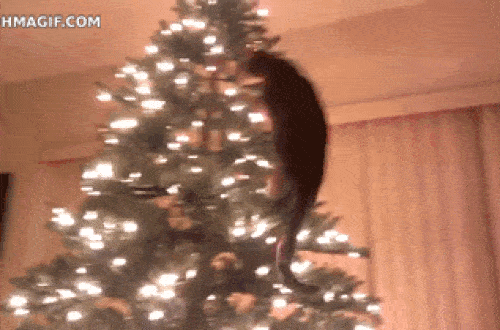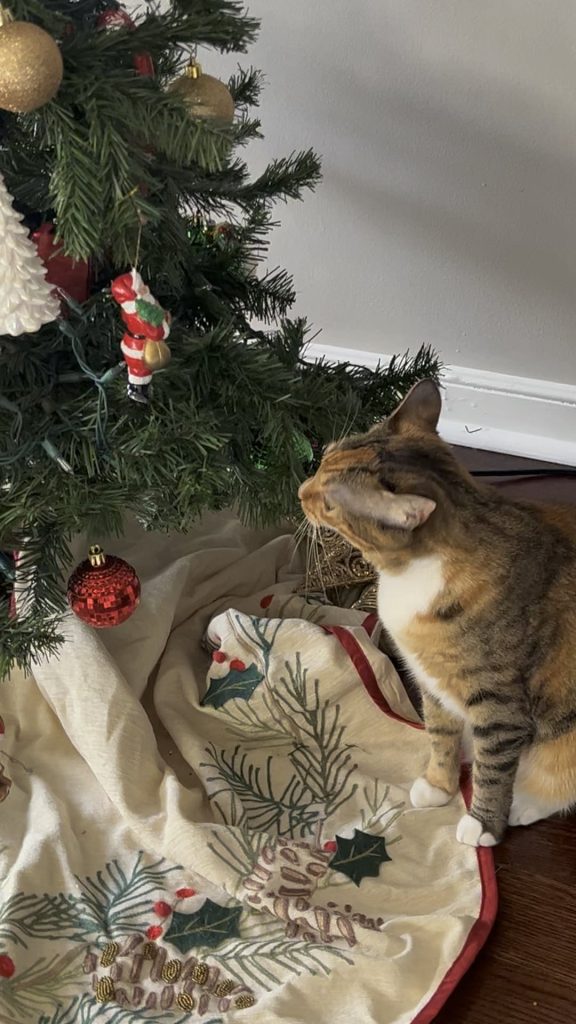The holiday season is a magical time filled with twinkling lights, festive decorations, and the charming presence of a Christmas tree. But if you’re a cat owner, you might find yourself wondering, “Are cats allergic to Christmas trees?”
This question might have crossed your mind as you noticed your feline friend sneezing or acting a bit off after the tree went up. You’re not alone in your concern, and it’s crucial to understand the potential effects of Christmas trees on your beloved pet’s health.
Imagine the peace of mind you’ll have by ensuring your home is both festive and safe for your furry companion. Discovering the truth about cats and Christmas trees will empower you to make informed decisions, allowing you to enjoy the holiday season without worry. Dive into the details, and let’s unravel the mystery behind this holiday conundrum. Your cat’s comfort and safety could be just a few paragraphs away!

Credit: raleighncvet.com
Common Christmas Tree Varieties
Pine, fir, and spruce are common Christmas tree varieties. Some cats might be allergic to these trees. Symptoms include sneezing and itching.
Decorating for the holidays often means bringing a beautiful, fresh tree into your home. But if you’re a cat owner, you might wonder if certain tree varieties could affect your furry friend. Understanding the common Christmas tree varieties can help you make an informed decision about which tree to bring home. Let’s dive into the characteristics of these trees and how they might impact your cat’s well-being.Pine Trees
Pine trees are a popular choice due to their classic look and pleasant aroma. However, their needles can pose a risk to your cat. If ingested, the needles can cause mild irritation to your cat’s stomach. Pine sap is sticky and can get onto your cat’s fur, which might lead to excessive grooming. If you notice your cat spending more time grooming than usual, it could be because of the sticky sap. Consider whether a different tree variety might be better suited for your household.Fir Trees
Fir trees, like the Douglas Fir, are known for their full-bodied shape and strong branches. These trees are generally safer for cats compared to pine trees because their needles are softer. Still, the needles can cause digestive issues if your cat decides to take a nibble. If your cat is naturally curious, you might see them batting at the lower branches. Adding a barrier or choosing a fir with higher branches can help prevent this. Have you ever tried using a tree skirt to deter your cat from exploring too closely?Spruce Trees
Spruce trees offer a unique look with their dense, bushy appearance and blue-green needles. While they add a touch of elegance, spruce trees are not without their challenges for pet owners. The needles are sharper and can be more bothersome if they fall to the ground. Cats that are sensitive to smells might find the strong scent of spruce overwhelming. If your cat seems to sneeze more often around the tree, it might be due to the tree’s natural aroma. Is it time to consider an artificial tree to keep your cat comfortable during the holidays? Choosing the right Christmas tree is not just about aesthetics; it’s about ensuring the safety and comfort of your cat. By understanding these common tree varieties, you can find a balance that keeps both your home festive and your feline friend happy.
Credit: vendblue.com
Potential Allergens In Christmas Trees
During the festive season, the sight of a beautifully decorated Christmas tree brings joy to many homes. However, if you’re a cat owner, you might be wondering if that lovely tree could pose any allergic risks to your feline friend. Christmas trees, while delightful, can harbor potential allergens that might affect cats. Understanding these allergens can help you ensure a safe holiday environment for your pet.
Sap And Resin
The sticky sap and resin found in many types of Christmas trees can be a concern. Cats are naturally curious and may be tempted to paw at or nibble on tree branches. The sap can irritate their skin, leading to discomfort or allergic reactions. If your cat seems unusually itchy or is grooming excessively, it might be worth checking if they’ve had contact with tree sap. Consider wiping the tree down or placing barriers to prevent your cat from getting too close.
Pollen And Dust
Christmas trees can carry pollen and dust, which can trigger allergies in both humans and pets. When setting up your tree, you might notice a burst of sneezes from your furry companion. Vacuuming around the tree regularly and using an air purifier can help reduce these allergens. Have you noticed your cat sneezing more often during the holidays? This could be a hint that pollen or dust is affecting them.
Mold And Mildew
Mold and mildew are common in live trees due to moisture and organic matter. These can exacerbate allergies in cats, causing symptoms like coughing or wheezing. Keeping the tree dry and ensuring proper ventilation can mitigate mold growth. If your cat shows respiratory distress during the festive season, consider checking for mold presence around your Christmas tree.
By being mindful of these potential allergens, you can create a safer environment for your cat during the holidays. Does your cat have a favorite spot away from the tree? Ensuring they have a cozy, allergen-free space can make all the difference in keeping them comfortable and happy. What steps will you take to protect your pet this Christmas?
Symptoms Of Allergies In Cats
While the holiday season brings joy and festivity, it can also bring unexpected challenges for pet owners. One such challenge is dealing with potential allergies in cats due to Christmas trees. Recognizing the symptoms of these allergies is crucial to ensuring your feline friend stays healthy and happy throughout the celebrations. Let’s take a closer look at some common symptoms of allergies in cats and how you can identify them.
Respiratory Issues
Cats can exhibit respiratory symptoms if they are allergic to Christmas trees. You might notice your cat sneezing more than usual or having a runny nose. Occasionally, wheezing or coughing might occur, especially if your cat gets too close to the tree. These symptoms can be worrying, but understanding their cause is the first step to addressing them.
Skin Irritations
Another sign of allergies in cats is skin irritation. Your cat may start scratching more frequently, or you might notice redness and inflammation on their skin. In some cases, your cat might develop bald patches from excessive grooming. When my cat Bella started scratching nonstop, it turned out she was reacting to the Christmas tree. A quick vet visit confirmed it, and we took steps to manage her symptoms effectively.
Behavioral Changes
Allergies can also impact your cat’s behavior. You might find your usually playful cat becoming lethargic or irritable. Changes in appetite or increased hiding can also indicate discomfort. Have you ever noticed your pet acting out of character around the holidays? It might be worth considering environmental factors like your Christmas tree.
By staying observant and proactive, you can help your cat enjoy the festive season without unnecessary discomfort. If you suspect your cat is allergic to your Christmas tree, consulting with a veterinarian can provide personalized advice and solutions. After all, your cat deserves to enjoy the holidays just as much as you do!
Preventive Measures
Christmas trees can cause allergies in cats due to oils and scents. Keep your cat safe by placing barriers around the tree and using cat-friendly decorations. Regularly clean fallen needles to prevent ingestion.
Preventive measures can help keep your cat safe around Christmas trees. Cats may react to pine oils and tree sap. Symptoms include sneezing and itching. Use these tips to protect your furry friend.Choosing The Right Tree
Select a tree with low sap production. Fir trees are often safer for cats. Avoid pine trees if possible. Artificial trees are another option. They don’t produce allergens. Ensure the tree is stable. Cats love climbing, which can cause accidents.Reducing Allergen Exposure
Keep the tree area clean. Vacuum often to remove fallen needles. Use a tree skirt to catch sap. Wipe the needles with a damp cloth. Limit your cat’s access to the tree. Use barriers if needed.Monitoring Cat Health
Watch for signs of allergies in your cat. Sneezing, itching, or coughing may occur. Check your cat’s skin for irritation. Be alert to changes in behavior. Call a vet if symptoms worsen. Regular check-ups can prevent serious health issues.Alternative Holiday Decorations
Creating a festive atmosphere without a traditional Christmas tree? It’s possible! Many worry about cats being allergic to real trees. Thankfully, there are alternative decorations that can keep your home merry and bright. These options won’t put your feline friend at risk.
Artificial Trees
Artificial trees are a safe substitute. They don’t release allergens like real trees. Choose a high-quality tree. Ensure it’s stable to prevent tipping. Cats love to climb! Pick one with soft branches. This reduces the risk of injury. Artificial trees last for years. You can reuse them annually. They come in various sizes and styles. Find one that fits your space.
Non-toxic Plants
Decorate with non-toxic plants. They add a natural touch. Consider plants like spider plants. They are safe for cats. Poinsettias are popular but can be harmful. Avoid them. Display ferns and palms. They are cat-friendly. Place them securely to prevent spills. Cats may knock them over. Research plants before buying. Safety is a priority.
Pet-friendly Ornaments
Choose pet-friendly ornaments. Avoid glass or sharp items. Opt for fabric or plastic decorations. They are less likely to break. Hang them higher on the tree. This keeps them out of reach. Use ribbons instead of hooks. Hooks can be dangerous for curious paws. Keep small decorations off the floor. Cats may try to chew them. Safety ensures a stress-free holiday.
:max_bytes(150000):strip_icc()/toxic-holiday-plants-to-keep-away-from-your-pets-3bdcc8b1915d4f9a8a96d54543d793fc.png)
Credit: www.dailypaws.com
When To Consult A Veterinarian
Cats may react to Christmas trees, showing signs of allergies like sneezing or skin irritation. Persistent symptoms suggest it’s time to consult a veterinarian. Understanding these reactions ensures a safe holiday environment for your feline friend.
As the festive season approaches, many pet owners find themselves asking, “Are cats allergic to Christmas trees?” While most cats are naturally curious and may experience mild reactions, there are times when it’s crucial to consult a veterinarian. Understanding when professional help is needed can make all the difference in ensuring your feline friend enjoys a safe and happy holiday.Persistent Symptoms
If your cat shows ongoing signs like sneezing, coughing, or itchy skin, it’s time to consider a vet visit. These symptoms might indicate an allergic reaction to pine needles, sap, or even mold that can grow on Christmas trees. Don’t dismiss these signs as mere seasonal changes. A friend once noticed her cat’s continuous sneezing around their Christmas tree. A quick vet visit revealed an allergy to the tree’s sap. Addressing the issue early prevented further discomfort for her pet. Could your cat be experiencing something similar?Emergency Situations
Certain situations demand immediate veterinary attention. If your cat has difficulty breathing, swelling, or shows signs of distress after interacting with the tree, seek urgent care. These could be signs of a severe allergic reaction or ingestion of toxic materials, like tree preservatives. Imagine the peace of mind knowing you acted swiftly. One pet owner rushed her cat to the vet when it started wheezing after chewing on a tree ornament. The prompt action saved her cat from a potentially life-threatening situation. Are you prepared to act just as quickly?Long-term Health Management
For cats with recurring allergies, long-term management is crucial. Your vet may recommend allergy testing or suggest alternative holiday decorations that don’t trigger reactions. Consistent monitoring and adjustments can keep your cat healthy year-round. Consider substituting real trees with artificial ones or using natural, cat-safe decorations. How about creating a festive, pet-friendly space that ensures your cat’s comfort? It’s a small change that can have a big impact on your pet’s well-being. By recognizing when to consult a veterinarian, you ensure your cat’s health and happiness during the holiday season. Are you ready to make this Christmas safe and joyful for your feline friend?Frequently Asked Questions
Are Christmas Trees Allergic To Cats?
Christmas trees aren’t allergic to cats, but cats can be allergic to tree sap or oils. Keep pets safe by using pet-friendly decorations. Prevent allergic reactions by choosing artificial trees and monitoring your cat’s behavior around holiday decor.
Is It Okay For Cats To Be Around Christmas Trees?
Cats can be around Christmas trees, but ensure safety. Secure the tree to prevent tipping. Avoid toxic decorations like tinsel and small ornaments. Keep electrical cords out of reach. Monitor your cat to prevent chewing or climbing. Providing safe alternatives, like cat-friendly toys, can help distract them.
Are Real Pine Christmas Trees Safe For Cats?
Real pine Christmas trees can be unsafe for cats. Pine needles may cause digestive issues if ingested. Secure the tree to prevent tipping. Use pet-safe decorations and avoid toxic tree water. Regularly clean fallen needles to ensure cat safety during the holiday season.
Is My Christmas Tree Making My Cat Sick?
Christmas trees can be toxic to cats. Pine needles may cause digestive issues if ingested. Tree water might contain harmful chemicals. Secure decorations to prevent choking hazards. Monitor your cat’s behavior around the tree. Consult a vet if any symptoms appear.
Conclusion
Cats can be sensitive to Christmas trees. Some trees and decorations irritate them. Monitor your cat during the holiday season. Keep them safe from harmful plants. Choose pet-friendly decorations. Enjoy the festivities with care. Your cat’s health matters. You can still have a joyful holiday.
Just be mindful of potential risks. Make your home safe for your furry friend. Pay attention to any unusual behavior. This ensures a happy, healthy holiday for everyone. Celebrate responsibly and keep your cat comfortable. A little precaution goes a long way.
Happy holidays with your beloved pets!
